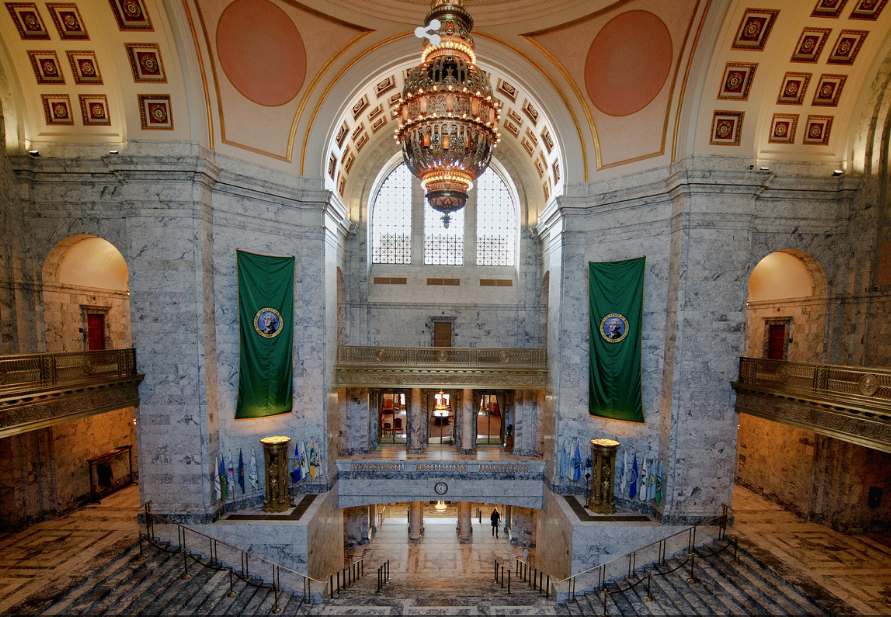January 22, 2021
NFIB Washington Legislative Update | Week 2
The Legislature’s experiment with remote testimony is angering members of the public not used to the rough and tumble of the committee hearing process. While legitimate technical issues continue to arise periodically, the unceremonious muting of individuals testifying on contentious issues may cause a backlash. The public doesn’t seem happy being abruptly cut off, midsentence, after 60 seconds during “public hearings.”
The Washington Policy Center’s Jason Mercier, who for years has been the most ardent champion of allowing remote testimony, had to walk back some of his early exuberance following two rather egregious examples of blatantly bad behavior by committee chairs. You can read more in Mercier’s blog post.
#OpenSafeOpenNow
A record turnout of nearly 1,650 people signed up to be heard on SB 5114, bipartisan legislation to move our state to Phase 2 re-opening, and put the Legislature, not the governor, in charge of moving regions forward or back.
But Sen. Sam Hunt, chair of the Senate State Government & Elections Committee, was unmoved. Hunt, who had been forced by Senate Majority Leader Andy Billig to hear the bill, filled the agenda with other bills, leaving little time for public comment on SB 5114, particularly given the huge turnout of people wanting to speak.
Hunt also declined a request by Sen. Jeff Wilson, the committee’s ranking member, to extend the hearing to another day. Instead, Hunt directed his vice chair and staff to mute microphones after 60 seconds. Dozens of people were silenced midsentence.
Not surprisingly, Hunt has not scheduled the bill for executive action, bogging it down in his committee.
NFIB is asking its members to contact their state senators, and Sen. Hunt, to demand the bill be moved out of committee.
By the way, the state Department of Health has, for the third week in a row, just announced the entire state will remain in Phase 1.
Environment
- HB 1084 – The House Environment & Energy Committee this week heard Gov. Jay Inslee’s bill to decarbonize commercial and residential buildings. Among other things, the bill would prohibit new natural gas hook-ups and add a fee to existing natural gas customers. NFIB opposes the bill.
- SB 5126 – The governor’s “cap and invest” carbon tax bill was heard this week in the Senate Energy, Environment & Technology Committee. NFIB opposes the bill.
Labor
- HB 1076 – This bill, heard Friday in the House Labor & Workplace Standards Committee, would allow private individuals, including interested third parties (unions and bounty-hunting trial lawyers), to sue employers in the name of the state for alleged violations of a host of workplace regulations. The bill is similar to California’s “private attorneys general act” (PAGA). NFIB opposes the bill.
- HB 1097 – In testimony this week, NFIB explained why this legislation should be called the governor’s “Bankrupting Small Businesses” bill, rather than “Increasing worker protections.” Among its key provisions:
- the bill would effectively double the nearly $10,000 daily penalty on employers who dare defy the governor and L&I’s shutdown orders
- worse, it would give those small-business owners just five days to secure legal counsel and file suit in superior court to contest the order
- it would also add a nearly $10,000 penalty on employers who layoff, terminate, or take other “discriminatory” actions against workers who refuse to report to work, claiming concerns about safety of health conditions, real or imagined
- an employer objecting to an L&I citation for these complaints would have to first appeal to the director of L&I, and then to the state Board of Industrial Insurance Appeals (which is stacked 2-to-1 against employers in favor of Big Labor), before being able to get independent review by a superior court.
It’s a thinly veiled attempt to bankrupt employers who refuse to be greenmailed or bullied by unions and disgruntled workers. The bill would also allow future diversions of employer-paid workers’ compensation taxes so L&I could offer some small businesses grants to implement new safety and health requirements during a state of emergency. L&I would like to discuss NFIB’s concerns with the bill. We remain opposed.
- SB 5046 – As discussed last week, this bill would finally allow lump sum payments to qualifying injured workers in lieu of a lifetime state pension. The lump sum payment:
- avoids a reduction in a worker’s social security disability payments
- allows the worker to pursue new employment opportunities (if physically able)
- and reduces long-term liabilities in the workers’ compensation system.
The bill was heard this week, and is already scheduled for executive action (approval) next week. NFIB supports the bill.
- SB 5097 – Substantially similar to HB 1073, also discussed in last week’s report, this bill would make significant changes to the state’s Paid Family & Medical Leave Program (PMFL), placing its solvency in jeopardy. The Senate version was heard in committee this week. NFIB opposes the bill.
- SB 5102 – This bill, which would add cost and red tape to independent medical examinations performed on injured workers to determine status for workers’ compensation claims, received a hearing this week in the Senate Labor, Commerce & Tribal Affairs Committee. NFIB opposes the bill.
- SB 5115 – The senate labor committee this week also considered chair Sen. Karen Keiser’s “Health Emergency Labor Standards Act.” Among its other provisions, this sprawling bill:
- would create a presumption that health care workers’ illnesses automatically qualify for workers’ compensation claims
- expand eligibility for PFML
- provide additional paid sick leave to workers quarantined or infected, who are caring for a family member who is quarantined or infected, or whose children’s school has been closed due to a health emergency
- require employers to boost worker pay during an emergency
- mandate larger employers provide child care leave during a health emergency
- prohibits “discrimination” against workers concerned about safety or health conditions
- allows qui tam authority for third parties to sue in L&I’s name for such violations.
NFIB opposes the bill.
- SB 5137 – NFIB signed in supporting the business community’s bill to suspend the 2022 workers’ compensation cost-of-living increase, and replace the annual adjustment mechanism with the CPI instead of increases in the state’s average wage. The bill is a longshot, but it is important lawmakers understand that these increases have been running 6-7% per year, compared to CPI increases of about 2%. As a result, workers’ compensation taxes had to be recalculated to cover nearly $750 million in payments from the Supplemental Pension Fund. These increases are not sustainable without future workers’ compensation tax hikes.
Tax & Fiscal
- HB 1015 – The House Consumer Protection & Business Committee adopted NFIB’s amendment adding small business representation to a proposed state Department of Commerce grant review panel. That panel would advise the department on allocating potentially millions of dollars for rural economic development programs. NFIB argued that hearing from small-business grant recipients should help inform the committee and department about the on-the-ground effectiveness of this proposed new state spending. The committee approved the bill with our amendment. NFIB supports the bill.
- HB 1095 – The House unanimously passed this essential legislation that would guarantee a B&O tax exemption for PPP, EIDL, and other government assistance to small businesses. This is a priority bill for NFIB, which we strongly support.
- HB 1135 – House Transportation Chair Rep. Jake Fey this week rolled out his and the governor’s massive transportation revenue and spending plan. The bill seeks to increase the state’s gas tax by 18¢ per gallon, and add a carbon fee of 13-15¢ per gallon. This could push the combined tax on fuel to $1 per gallon, reclaiming Washington’s title as highest in the nation. NFIB opposes the bill.
- SB 5096 – NFIB Washington Leadership Council Vice Chair Lois Cook received some great press coverage following her testimony opposing the governor’s capital gains tax plan. NFIB appreciates the many members (and non-member small business owners) who joined us testifying against this legislation last week.
- SJR 8200 – NFIB continues to support a state constitutional amendment allowing the investment of payroll taxes collected to fund the Long-Term Services & Supports trust fund. Voters rejected the amendment last fall. The resolution was heard this week in the Senate Ways & Means Committee.
Previous Reports and Related News
- January 15–Week 1 Legislative Report. Senate Bill Would Stop the State from Following the “Roadmap to Ruin”
- January 10–Spokesman-Review Guest Editorial: Inslee Agenda Seeks to Destroy Even More Small Businesses
NFIB is a member-driven organization advocating on behalf of small and independent businesses nationwide.
Related Articles















